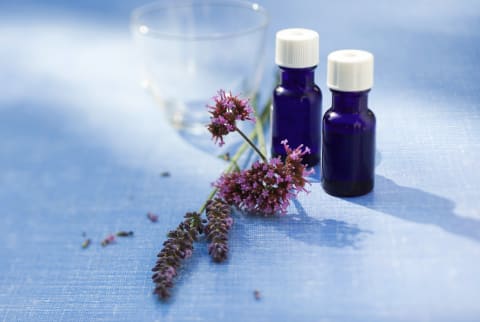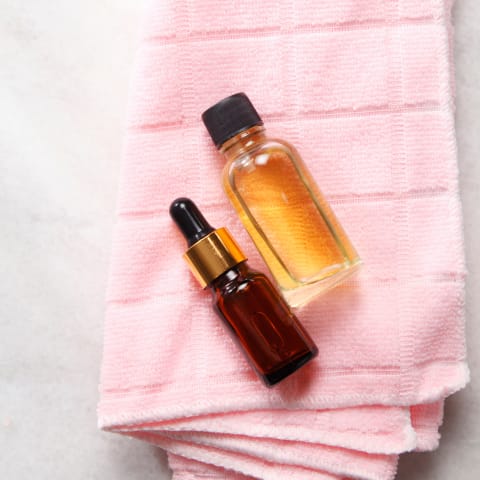Advertisement
Here's Exactly When To Use Essential Oils For Your Best Night's Sleep


The circadian rhythms, otherwise known as the human body clock, regulates much more than our patterns of wakefulness and sleep. Scientists are rapidly discovering that these natural rhythms influence a wide variety of physiological processes with a far-reaching impact. Circadian rhythms affect hormonal production, mood, ability to concentrate, and many more critical aspects of our day-to-day lives. Even our senses are affected by these natural fluctuations linked to day and night.
Until relatively recently, it was assumed that variations in olfactory sensitivity (the sense of smell) depended only on the individual. It was believed that while there was significant individual variability in the sense of smell, each individual had a set threshold in their ability to detect odors unless they have a cold or other condition explicitly affecting their nose. While the emotional state was thought to have some influence on our ability to smell, it was the broad assumption that the sense of smell is fixed.
The best time to use essential oils.
Recent studies conducted at the Sleep for Science Research Lab (Brown Medical School) have uncovered a remarkable variation in our sense of smell. This variation in ability seems to be closely linked to circadian rhythms. The research was initiated to investigate the possible relationship between the sense of smell and food choices, specifically to help teenagers make better food choices. But the results could have a much broader impact and certainly raise interesting questions about why, evolutionarily, we have developed greater smell sensitivity for different times of the day.
The research was conducted on a sample of 37 teenagers who, for nine days, were tested to determine the lowest threshold at which they could detect a specific odor. Saliva samples were used to determine the phase of the circadian cycle, and this was plotted against the odor sensitivity test.
The results of the study1 demonstrated that the average peak odor sensitivity occurred not long after the production of melatonin, around 9 p.m. The study states: "These data demonstrate for the first time that olfactory sensitivity is not a stable trait; rather, it is modulated by circadian phase." In contrast, the ability to smell was least sensitive between 2 and 10 a.m.

Why essential oils work.
The exact mechanisms underlying the effects of essential oils on the brain are not yet understood. It is believed that the smell receptors in the nose communicate directly with the brain. The areas of the brain responsible for emotional control and memory (amygdala and hippocampus) are stimulated by the inhalation of the volatile compounds found in some essential oils, like lavender. The activation of these control centers in the brain is thought to influence various physical, emotional, and mental attributes. The specific stimulation of positive emotions combined with therapeutic touch is believed to be behind the beneficial and relaxing effects of aromatherapy massage.
How to use your oils for restorative sleep.
You can use specialized oil diffusers that send a little electric current through water to vaporize oils into the air in a fine mist. Or simply put a few drops on a tissue or piece of fabric near your bed. Inhalation is uniquely suited to rapid calming of the emotions due to the direct nose-brain connection.
A few drops of oil can be rubbed onto the palms (which has thicker, less sensitive skin) and then rubbed over the chest and arms to penetrate the skin, allowing you to smell the oil throughout the night as it is warmed by the body. Application to the soles of the feet is another excellent way to get the therapeutic compounds into the blood, especially if you prefer not to smell the oil, which is farther from your nose. Topical application will physically soothe the body, specifically the nervous system.
Lavender
This is the most popular oil for sleep induction. Try this first and see how it affects you. For some, it can be a little too powerful, causing feelings of disorientation if you need to visit the bathroom in the night and making you sleep much longer than usual. Try a few drops at first and gradually increase the dose until you reach the desired effect. Lavender is also a relatively inexpensive essential oil, due to its popularity and mass production. Beware of overuse, and if you consistently need sleep support, it is recommended you cycle between different oils, so your body does not get used to it and become less receptive to its effects.
Chamomile
This has traditionally been used to soothe children, combat depression, reduce stress, and help you wind down and get to sleep. It is a mild sedative that calms the nerves while reducing anxiety and is even used to cut nightmares while combating insomnia. The sedative effects are thought to be due to a specific compound found in the oil apigenin, which binds to receptors in the brain. Chamomile tea is one of the best-known sleep-inducing teas.
Valerian
This is also known as a mild sedative. In addition to inducing sleep, it calms the nerves and reduces stress. A meta-analysis of multiple studies published in the American Journal of Medicine confirmed that valerian does indeed improve the quality of sleep without the side effects associated with current pharmaceutical interventions. A further meta-analysis published in the Journal of Sleep Medicine again confirmed valerian's subjective ability to aid sleep but also noted that additional qualitative analysis was needed to create robust data and definitive marketable conclusions.
The sleep-inducing properties of oils can be enhanced by blending them together, either using proprietary blends or merely mixing together a few yourself. A triple-blind study published in the Journal of Women and Health found that lavender with bitter orange significantly improved both the duration and quality of sleep while the use of lavender combined with sweet orange on hemodialysis patients enhanced overall sleep quality and significantly reduced fatigue.
How to use your oils to help you wake up.
A simple and reliable method to get the pleasant smells and beneficial effects into your room and body is to use a diffuser. Half asleep, you can reach over and switch it on or even use a timer so that, as soon as you wake up, you are greeted by the fragrance. The less high-tech method of dabbing it on a tissue and simply sniffing is also useful.
Combining a few drops of a single oil or your own oil blend with water in a spray bottle creates a handy pick-me-up you can use to spritz yourself in the morning or anytime you feel your energy lagging. A few puffs of atomized oils in water create an aromatic mist that can settle on your skin, clothes, or the local environment. In addition to the physical and emotional effects of the plant compounds, it is also a method of overcoming the ego and deciding how you want to feel. Fatigue is much more of a mental than a physical problem. For example, when athletes tire, it is the mind, not the body, that sets the limits.
You can get the smelling and healing benefits of oils by using a few drops (of a single oil or blend) in the shower. Either spritz from a spray bottle or apply to a washcloth and allow the warm water to spread the volatile compounds and enthuse you with their energy. You can even use ready-made body washes containing refreshing oils like peppermint and citrus to boost the body while keeping it clean.
Citrus
Oils like grapefruit, sweet orange, and mandarin calm the emotions in addition to delivering a pleasant uplifting smell. They blend well with one another, and other oils and are typically warming and energizing, creating a gentle lift for your mood and energy.
Eucalyptus
This powerful-smelling oil has natural antibacterial properties and stimulates the immune system while acting as a mental wake-up call. It stimulates cold receptors in the nose, making airflow feel increased and stimulating the brain with additional data.
Peppermint
This powerful odor has explicitly been shown to reduce daytime sleepiness, although the exact method of action is not understood. The smell of peppermint has also been shown to increase alertness and can even wake people from sleep. These findings suggest that a mint-flavored toothpaste might not be suited to nighttime dental hygiene! Adding the fragrance to your shower could also help boost energy and even hair growth, as it has been shown to prevent and even reverse male-pattern balding and induce hair growth.
Rosemary
Studies have shown that inhalation of rosemary oil increases feelings of alertness. It also acts as a neuroprotective agent and is being studied for its ability to reduce symptoms of Alzheimer's, inhibit neural cell death, and reduce inflammation in the brain. Any substance that boosts the brain in the morning will help you feel more alert and ready to face the day. Rosemary also increases blood pressure, heart rate, and respiration, getting the necessary oxygen and nutrition to your brain and muscles to energize you and get you up and going in the morning.
Further study is needed to understand their methods of action, confirm the long-term safety, and understand potential interactions with drugs and other oils. However, thousands of years of successful treatment with plant-based medicines (specifically concentrated essential oils) is a testament to their potential to work in harmony with humans, aiding a wide variety of conditions and helping us manage our own sleep-wake cycles.
Watch Next
Enjoy some of our favorite clips from classes
Enjoy some of our favorite clips from classes
What Is Meditation?
Mindfulness/Spirituality | Light Watkins
Box Breathing
Mindfulness/Spirituality | Gwen Dittmar
What Breathwork Can Address
Mindfulness/Spirituality | Gwen Dittmar
The 8 Limbs of Yoga - What is Asana?
Yoga | Caley Alyssa
Two Standing Postures to Open Up Tight Hips
Yoga | Caley Alyssa
How Plants Can Optimize Athletic Performance
Nutrition | Rich Roll
What to Eat Before a Workout
Nutrition | Rich Roll
How Ayurveda Helps Us Navigate Modern Life
Nutrition | Sahara Rose
Messages About Love & Relationships
Love & Relationships | Esther Perel
Love Languages
Love & Relationships | Esther Perel
What Is Meditation?
Box Breathing
What Breathwork Can Address
The 8 Limbs of Yoga - What is Asana?
Two Standing Postures to Open Up Tight Hips
How Plants Can Optimize Athletic Performance
What to Eat Before a Workout
How Ayurveda Helps Us Navigate Modern Life
Messages About Love & Relationships
Love Languages
Advertisement

Want To Be Metabolically Healthy? New Study Shows An Underutilized Approach
Molly Knudsen, M.S., RDN

Bounce Back Quickly After Workouts With This DIY Electrolyte Drink
Molly Knudsen, M.S., RDN

This Gave Me Osteoporosis At 32 & Here's What I Wish People Knew
AmiCietta Duche Clarke

New Study Shows This Vitamin May Lower Your Risk Of Alzheimer’s By 17%
Molly Knudsen, M.S., RDN

Want To Be Metabolically Healthy? New Study Shows An Underutilized Approach
Molly Knudsen, M.S., RDN

Bounce Back Quickly After Workouts With This DIY Electrolyte Drink
Molly Knudsen, M.S., RDN

This Gave Me Osteoporosis At 32 & Here's What I Wish People Knew
AmiCietta Duche Clarke

New Study Shows This Vitamin May Lower Your Risk Of Alzheimer’s By 17%
Molly Knudsen, M.S., RDN









